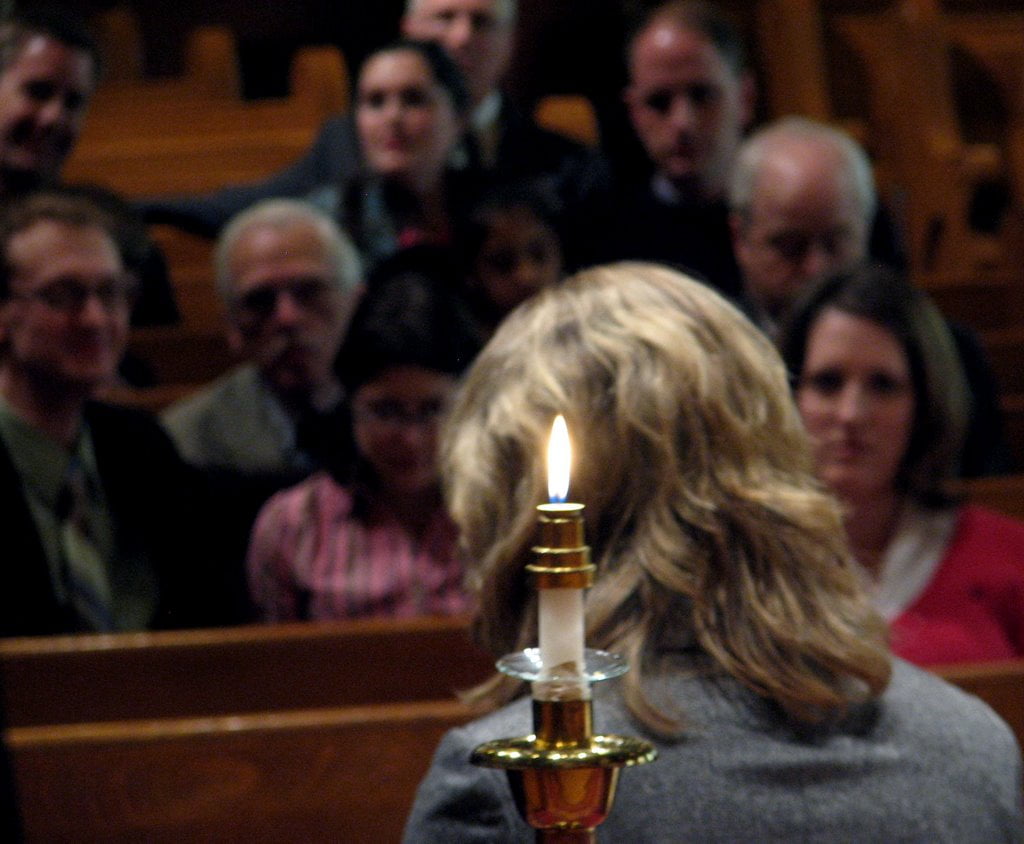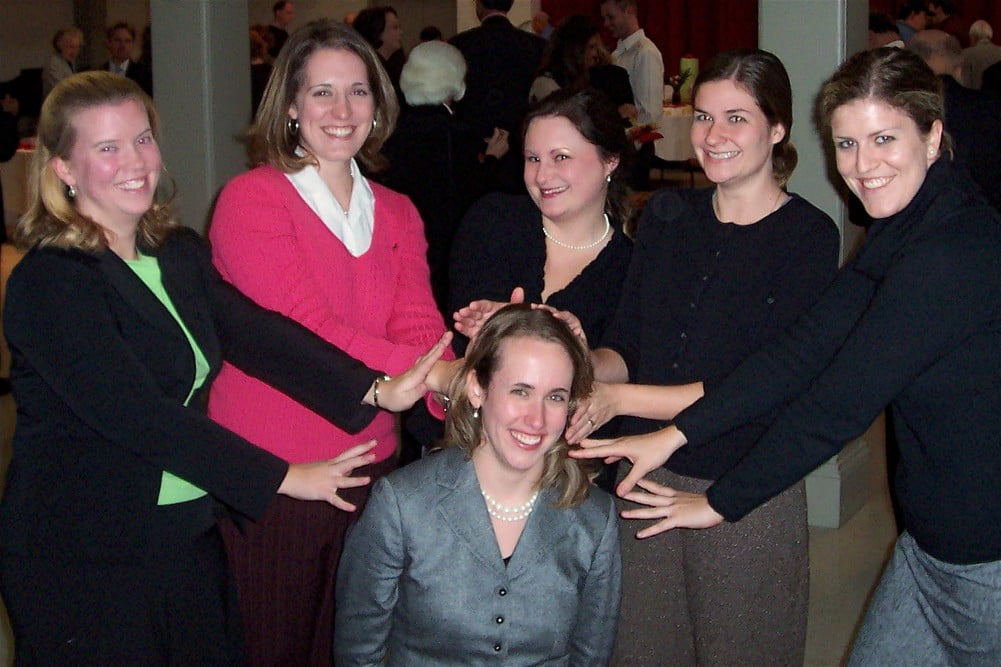Good morning! Has this been a good week? Have you felt full of gratitude? Happy?
If you answer yes (it's ok if it is not), you might be feeling our word of the week: blessed.
Blessed: experience that brings pleasure, contentment or good fortune.
It is so cliche these days to post a picture online or wear a t-shirt that says #blessed. Even if we are thankful for the gifts of relationships or opportunities around us, the use of the word blessed sometimes feels like telling a telling a half-truth. Our lives are complicated. We don't really want to be people who brag either.
But, might there be a way to reclaim blessed no matter our feeling or situation?
I love Kate Bowler's and Jessica Richie's new book, Good Enough: 40ish Devotionals for a Life of Imperfection for its gifts of re-framing stuff in my life that I would never put in the "blessed" category. Like loss, failure and depression. . . .
Here's one of my favorite parts: "A Blessing for When You Realize Everyone is Struggling"
Blessed are you who have realized that life is hard. And it's hard for everyone. Your awareness came at a cost. You lost something you can't get back. You were diagnosed with chronic pain or degenerative disease. Your family fell a part and things have never been the same. Blessed are you who gave up the myth that the good life is one of happiness, success, perfection. The life that looks beautiful on Facebook, but isn't real. . . . Blessed are all of us who struggle, for we are in good company, and we'll never walk alone.
Such words are an invitation to all of us to SEE again our lives as God sees them-- the real, honest, truth of the pain of day-to-day living as a human being living on planet earth.
Because here's the thing: your life can be falling a part (and nothing can feel right) but still the blessing of God can be with you.
To feel blessed is not just for the special. To feel blessed is not about everything being in place. To feel blessed is not about pretending either.
God's gift of presence with us means that blessings are always around. Even in death, even in sickness, even in great loss. Blessings can come even when you have no idea how they are coming or where they are coming from. In fact, I tell you, good can come from the worst parts of your days. Such is the miracle of our faith-- God can take what we think is ugly, useless and worn down and turn into something beautiful.
May you have eyes to see and be blessed this week-
XO
Elizabeth
I Will Bless You To Bless Others
Genesis 12:1-9
Watonga Baptist Indian Mission, Watonga, OK
July 7, 2013
When is the last time that you said to someone “Bless you?”
Usually the most frequent time we say this is when someone sneezes. “Ahhchooo!” And you say, “Bless you.”
Or maybe when we’re getting ready to say goodbye to a friend or someone special. We say, “Bless you or God bless you.”
Or maybe even some of us have had a time in our life when someone has blessed us. For example, a loved one has sent us a special card on Mother’s or Father’s day or our birthday, simply to say: “I’m so glad you’re in my life” or “I’m so glad you were born.”
 I can remember a special event in my life completely centered around the idea of others blessing me. On November 4, 2006, after finishing all the necessary coursework and ordination interviews, I was ordained to the gospel ministry. It was a cold fall day in Washington, DC when my friends and family gathered at Calvary Baptist Church to pray and lay hands of blessing on me. (Actual picture to the right of the service).
I can remember a special event in my life completely centered around the idea of others blessing me. On November 4, 2006, after finishing all the necessary coursework and ordination interviews, I was ordained to the gospel ministry. It was a cold fall day in Washington, DC when my friends and family gathered at Calvary Baptist Church to pray and lay hands of blessing on me. (Actual picture to the right of the service).
While it was a wonderful service of music, scripture reading and prayer and even a really nice reception that my mother-in-law and father-in-law to be put together for the occasion—what I really remember the most about the day is not these things. Rather, it is the blessing I received.
I don’t know if you’ve been to ordination service recently or even ever. But there comes a time in every service of this nature that the congregation lays hands on the person(s) being ordained (or called out) to ministry of some kind. It’s a time when those attending the service offer words of blessing in the ear of the man or woman being commissioned for service.
On this day, family and friends said so many encouraging things to me and I remember several of the blessing prayers word for word (even still to this day), but there’s one blessing in particular that I want to share with you today.
A dear friend’s husband came up to me, “I bless your feet. I bless your hands. I bless your head. I bless your ears. I bless you so that you can bless others.”
I was a bit taken back by these words in the telling as this friend’s husband who I barely knew at the time was actually touching my feet, my heads, and my ears as he spoke.
 Yet, even with these memorable mannerisms, the heart of what he was saying was: “I want to bless you, Elizabeth so that you can bless other people in your ministry.” And what an awesome act of commissioning it was! Nearly seven years later I still remember this moment vividly! These were words spoken into my life (though I didn’t fully understand them at the time) that would become beacons of encouragement, moving me in the right direction especially on days when I wondered why in the world would I be called to serve as I am.
Yet, even with these memorable mannerisms, the heart of what he was saying was: “I want to bless you, Elizabeth so that you can bless other people in your ministry.” And what an awesome act of commissioning it was! Nearly seven years later I still remember this moment vividly! These were words spoken into my life (though I didn’t fully understand them at the time) that would become beacons of encouragement, moving me in the right direction especially on days when I wondered why in the world would I be called to serve as I am.
In our Old Testament lesson for this morning, we encounter a radical act of blessing that too would continue to unfold over time. It’s the first time in the entire narrative of scripture that we read of a particular blessing to a particular person. And this particular person is called Abram. We may know him more widely as Abraham (it’s the same guy, just before his relationship with God would later change his name).
I want to turn back one chapter from the scripture we just read to Genesis 11 so that we can get the full story of what was going on in the story between Creator God and God’s creation prior to Abram encountering the Lord in Genesis 12.
As you might recall, some of the earliest stories of scripture are about God reaching out in relationship to all of human kind . . . stories like Adam and Eve in the garden and Noah building an ark. Yet, things didn’t go so well from the start. As much as God tried to be in relationship with all human kind, humanity kept rejecting God’s ways of how relationship would form. Adam and Eve were kicked out of the garden. The whole world besides Noah and his family were destroyed in a flood.
And by the time we get to Genesis 11, we learn that everyone gathered in one place, and decided to build a tower to the heavens in an effort to reach God Himself. (God and humanity still did not understand each other!)
But what does the Lord do? Scripture tells us that the Lord comes down and confuses their tongues. And all the tribes and peoples of the world scatter—each group going their own way, speaking their own language.
God’s plans of being in relationship with humanity seem lost. It seems like one big fail. Scatter is the key word.
But if there is anything we know about God, God keeps trying. God keeps pursuing. A new plan will have to emerge. God created human kind after all for: relationship with the Lord
And we read about this Plan B in Genesis 12. A God who was once scattering is now gathering AND speaking a particular word to a particular person named Abram saying, “Leave your country, your people, and your father’s household and go the land I will show you.”
God gives Abram something very specific—to leave his home, to leave the familiar and to go to the place where God would show him.
When we think of calls of God coming to people—particular assignments—in our country, we often think of calls coming to people who are usually middle-aged. You know, old enough not to be young . . . yet, educated and full of natural energy to get the job done. Or as I like to say it, men in their 40s with 2.5 kids and a beautiful wife: what everyone seems to want in their leader.
coming to people who are usually middle-aged. You know, old enough not to be young . . . yet, educated and full of natural energy to get the job done. Or as I like to say it, men in their 40s with 2.5 kids and a beautiful wife: what everyone seems to want in their leader.
But did you notice when I read in verse 4 how old Abram was? 75 years old! He was not in his “young” and “prime” years. But God didn’t care about any of those conventional things.
Can you imagine the call of God coming to you at the ripe age of 75 years old? Can you imagine leaving your home place, your family, your tribe at this age simply because God told you to move?
But let’s take a closer look and discover why Abram had to leave and what exactly this mission was. Verse 2 gives us particular reasons. God says to Abram:
“I will make you into a great nation and I will bless you. I will make your name great, and you will be a blessing. I will bless those who bless you, and whoever curses you I will curse; and all peoples on earth will be blessed through you.”
Abram was asked by God, you see, to leave all he knew and follow the leading of the Lord for one huge reason: to bless others.
It wasn’t going to be a mission about some special seat of privilege for him.
It wasn’t even going to be about Abram’s immediate family being honored in some special way.
It was going to be about every living human being from this point on in history somehow being connected to the family that Abram was going to be the father of . . . Father Abraham would have many sons as the children’s song goes.
God wanted to draw all people again to himself, and this time the plan would be to work through a particular person with a particular mission. And the mission was all about blessing.
But what exactly does this mean? What does it is mean to bless others?
I think it is more than saying, “Bless you” when a person sneezes or even more than the times when we lay hands on someone becoming a minister during the course of a special service . . . rather in this first case of blessing, God’s call came to Abram that day as a promise. It was about his being a keeper of a promise. And this would be the blessing.
You see, if we skip ahead and read more of what happened to Abram as his story unfolded, we realize that ultimately Abram never saw “all people of the earth” being “blessed through him.” In fact, so much of his story is about struggling to know the path to add that desired son to his family—as childbearing didn’t come natural to his wife.
And so as much as God told Abram that he was to be the father of a great nation, when he looked around his life, he was the biological father of no one at the time. He had no offspring.
But to this the LORD says to Abram in chapter 12, verse 7, “To your offspring I will give this land.”
It was quite a bold blessing. Don’t you think so? To tell a man who has no kids and whose wife is past childbearing act that to your offspring, I will give this land? Some folks might even call a God like this crazy.
Sure in a few years a child would finally come into Abram’s life: Isaac, but never would Abram get to snap his fingers and see the full picture of what God’s blessing “for all people” was about. Abraham would go on to die a death without ever seeing the promised land.
But this is exactly the point that I believe our text wants us to see today.
God calls us to blessing so that we can hold on to a promise that we may never see with our own eyes fulfilled, but that we get to set in motion.
“I will bless you to bless others.”
In the late 1970s a revolution began in the Latin American country of El Salvador. An oppressive regime ruled and took this once peaceful land into a state of chaos. The poor of the nation became even more oppressed than they previously felt. Church leaders feared what the government leaders would do if they didn’t side with them. Most church leaders went so far as to sign pacts, ignoring the cries of the poor and the needy in their midst.
Yet there were some pastors and priests who stuck close to the message of Jesus and God’s love for all people and refused to do as the government leadership wanted from them. The priest Oscar Romero was one of them. All his life he had been just a normal priest—going about the daily work of caring for his parish, later being promoted, though to the position of Archbishop. Yet, there came a day when he could not allow injustice to continue. By 1979, Oscar Romero was fully committed to being a voice for the poor—even going as far to criticize the United States government for giving aid to the El Salvadorian government.
He sermons and speeches became a powerful voice of God’s love for all . . . even if it wasn’t the most popular thing to say. The following is his famous prayer about how he understood what it meant to be blessed so that others could be blessed through him—seeing the big picture. He prayed:
It helps, now and then, to step back and take a long view.
The Kingdom is not only beyond our efforts,
it is even beyond our vision.
We accomplish in our lifetime only a tiny fraction
of the magnificent enterprise that is God’s work.
Nothing we do is complete,
which is a way of saying that the Kingdom always lies beyond us. . . .
We plant the seeds that one day will grow.
We water seeds already planted,
knowing that they hold future promise.
We lay foundations that will need further development.
We provide yeast that produces effects far beyond our capabilities.
We cannot do everything,
and there is a sense of liberation in realizing that.
This enables us to do something,
and to do it very well.
It may be incomplete, but it is a beginning, a step along the way,
an opportunity for the Lord’s grace to enter and do the rest.
We may never see the end results,
but that is the difference between the master builder and the worker.
We are workers, not master builders;
ministers, not messiahs.
We are prophets of a future that is not our own. Amen.
And in the end, such was indeed true with Oscar Romero’s life . . . as it also was true of Abram’s life as well. Just as Abram never would be the one that would lead a multitude of people into the promise land, so Oscar Romero would not see the fruit of his calls to justice either.
In fact while celebrating mass in his church on March 24, 1980, he was assassinated while holding up the communion cup in front of the altar. Romero died while in the act of holding on to the promise that God wanted all people of El Salvador to be blessed equally.
Yet, today the memory of Romero lives on, inspiring the justice work of priests throughout El Salvador. Even though the first democratic government was elected four years ago, danger, unrest and lack of concern for the poor of the land lives on. Romero’s death encourages a new generation of leaders who believe as he did that Jesus calls us to care for the needs of all people.
“I will bless you to bless others.”
It’s hard to be ok with this kind of blessing. It goes against every instant gratification bone in our body. It might even seem like a waste of time to believe that God wants to use us—just as God used Abram and Oscar Romero—to hold on to promises that are to be fulfilled in what is to come and not in our lifetime.
But as Romero prayed, “We are prophets in a future that is not our own.”
How will you allow God to bless you?
How will you allow God to bless others then through you?
How will you wait with the promise of blessing with what you can not see or touch or feel right now, but is to come?
How will you follow in the steps of Father Abraham claiming a good, good future but is not your own, but of the Lord?
Let us seek the Lord together as we ask for God’s blessing this day as we seek to answer these questions in community.
AMEN
 Do we truly understand how much God loves us and wants to bless us?
Do we truly understand how much God loves us and wants to bless us?
Today in worship we talked how BLESSING is one of the themes found in Matthew's Beatitudes-- that as Jesus spoke these words of "Blessed are . . ." he was seeking to tell this followers exactly how he already felt about them. Jesus spoke to the disciples not as those whom he was commanding to act a certain way, but as a loving teacher to a group of people he cared deeply for.
We also talked about how hard it is for us to receive Jesus' blessing on us because we want to assume it comes with conditions that sound like "you must do this first." Could Jesus possibly love us even if we don't come to him in perfection yet?
Henri Nouwen, a Catholic priest, author and professor, tells the following story about how hard it is for all of us to receive blessing but also how each of us hungers for it more than we realize.
While living in the L'Arche community for mentally and physically challenged adults called Daybreak in Toronto, Canada as a resident chaplain, he found himself in the following conversation with a patient there while going about his daily chores:
A woman named Janet came up to Henri and asked for a blessing. In response, he remembers walking up to her and giving her a little cross on her forehead.
But, she said, "Henri, it doesn't work. No, that is not what I meant."
Henri notes that was embarrassed and said, "I gave you a blessing." She said, "No, I want to be blessed." He kept thinking, "What does she mean?"
[Later on] there was a worship service. After the service Henri said, "Janet wants a blessing." He had an alb on and a long robe with long sleeves. Janet walked up to Henri and said, "I want to be blessed." She put her head against my chest and he spontaneously put my arms around her, held her, and looked right into her eyes and said, "Blessed are you, Janet. You know how much we love you. You know how important you are. You know what a good woman you are."
She looked at Henri and said, "Yes, yes, yes, I know. I suddenly saw all sorts of energy coming back to her. She seemed to be relieved from the feeling of depression because suddenly she realized again that she was blessed. She went back to her place and immediately other people said, "I want that kind of blessing, too."
Henri went on to recount, "Then, countless people kept walking up to me and I suddenly found myself embracing people. I remember that after that, a man in our community who assists the handicapped, a strong guy, a football player, said, 'Henri, can I have a blessing, too?' I remember our standing there and I put my hand on his shoulder and said: "you are blessed. You are a good person. God loves you. We love you. You are important. Can you claim that and live as the blessed one?"
And this process, according to Henri, went on and on for days as members of the community heard that he gave out blessings."[i]
We all need blessing more than we sometimes know.
So, after I shared this story in my sermon and we had a service of communion with one another, I offered the congregation a blessing if they wanted it. Several deacons assisted in this by standing to the side of the room with hands open wide to give hugs and the blessing of "Jesus loves you." Several folks told me after the service how powerful it was for them to leave worship with the experience of having a blessing instead of just hearing about one for others. I think we might just need to engage in this spiritual practice of hugging more often.
Worship with a hug . . . sometimes it is the smallest gestures that can be so powerful.
[i]
http://www.csec.org/csec/sermon/nouwen_3502.htm